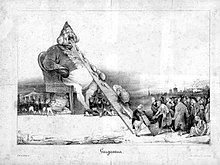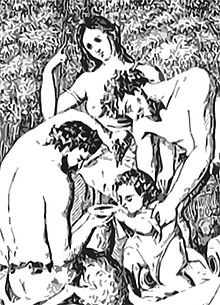François Rabelais

François Rabelais (ca. 1493 – April 9 1553) was a French humanist writer of satirical romances.
Quotes
[edit]

For laughter makes men human, and courageous.
BE HAPPY!
- Je m'en vais chercher un grand peut-être; tirez le rideau, la farce est jouée.
- I am going to seek a grand perhaps; draw the curtain, the farce is played.
- Last words, according to the Life of Rabelais (1694) by Peter Anthony Motteux.
- Variant translations:
- I am going to seek the great perhaps.
- I am going to search for the great perhaps.
- I am going to seek a grand perhaps; draw the curtain, the farce is played.
- Je n'ai rien vaillant; je dois beaucoup; je donne le reste aux pauvres.
- I have nothing, owe a great deal, and the rest I leave to the poor.
- His one line will, as quoted in Arthur Machen : A Short Account of His Life and Work (1964) by Aidan Reynolds and William E. Charlton, p. 186
- I have nothing, owe a great deal, and the rest I leave to the poor.
Gargantua and Pantagruel (1532–1564)
[edit]- Gargantua and Pantagruel Full text online at Project Gutenberg, Books I through V, as translated by Sir Thomas Urquhart and Peter Anthony Motteux in The Works of Francis Rabelais (1854)
- Readers, friends, if you turn these pages
Put your prejudice aside,
For, really, there's nothing here that's outrageous,
Nothing sick, or bad — or contagious.
Not that I sit here glowing with pride
For my book: all you'll find is laughter:
That's all the glory my heart is after,
Seeing how sorrow eats you, defeats you.
I'd rather write about laughing than crying,
For laughter makes men human, and courageous.
- BE HAPPY!
- Introduction, as translated by Burton Raffel (1989)
- BE HAPPY!
Gargantua (1534)
[edit]- Full text online at Wikisource (Book I of the series though actually published after Pantegruel)

- La vie inestimable du grand Gargantua, père de Pantagruel Gargantua, The Inestimable Life of the Great Gargantua, Father Of Pantagruel, as translated by Thomas Urquhart (1653) and Peter Antony Motteux






With a good mind,
Do here pursue with might
Grace, honour, praise, delight.

Expounders of the Scriptures old and new.


May it always afford
T' us all in common,
Both man and woman,
A spiritual shield and sword,
The holy sacred Word.

- Pour ce que rire est le propre de l'homme.
- It becomes you to be wise to smell, feel, and have in estimation these fair books, de haulte gresse, light in the pursuit, and bold at the encounter. Then you must, by a curious reading and frequent meditation, break the bone and suck out the substantific marrow, — that is what I mean by these Pythagorean symbols, — with assured hope of becoming well-advised and valiant by the said reading; for in it you shall find another kind of taste, and a doctrine more profound, which will disclose unto you deep doctrines and dreadful mysteries, as well in what concerneth our religion as matters of the public state and life economical.
- Prologue
- Revenons à nos moutons
- To return to our wethers.
- Chapter 1; a proverb taken from the French farce of "Pierre Patelin," edition of 1762, p. 90
- I drink no more than a sponge.
- Chapter 5
- Appetite comes with eating, says Angeston. But the thirst goes away with drinking.
- Chapter 5
- Natura abhorret vacuum.
- Translation: Nature abhors a vacuum.
- Chapter 5
- As soon as he was born, he cried not as other babes use to do, Miez, miez, miez, miez, but with a high, sturdy, and big voice shouted about, Some drink, some drink, some drink, as inviting all the world to drink with him. The noise hereof was so extremely great, that it was heard in both the countries at once of Beauce and Bibarois. I doubt me, that you do not thoroughly believe the truth of this strange nativity. Though you believe it not, I care not much: but an honest man, and of good judgment, believeth still what is told him, and that which he finds written.
- Chapter 6 : How Gargantua was born in a strange manner
- Thought the moon was made of green cheese.
- Chapter 11
- He always looked a given horse in the mouth.
- Chapter 11
- By robbing Peter he paid Paul, … and hoped to catch larks if ever the heavens should fall.
- Chapter 11
- He did not care a button for it.
- Chapter 16
- How well I feathered my nest.
- Chapter 17.
- He laid him squat as a flounder.
- Chapter 27
- So much is a man worth as he esteems himself.
- Chapter 29
- Send them home as merry as crickets.
- Chapter 29
- A good crier of green sauce.
- Chapter 31
- Then I began to think that it is very true which is commonly said, that the one half of the world knoweth not how the other half liveth.
- Chapter 32
- Les heures sont faictez pour l'homme, et non l'homme pour les heures.
- I never follow the clock: hours were made for man, not man for hours.
- Chapter 39 (frère Iean des Entommeures)
- Being come down from thence towards Seville, they were heard by Gargantua, who said then unto those that were with him, Comrades and fellow-soldiers, we have here met with an encounter, and they are ten times in number more than we. Shall we charge them or no? What a devil, said the monk, shall we do else? Do you esteem men by their number rather than by their valour and prowess? With this he cried out, Charge, devils, charge! Which when the enemies heard, they thought certainly that they had been very devils, and therefore even then began all of them to run away as hard as they could drive, Drawforth only excepted, who immediately settled his lance on its rest, and therewith hit the monk with all his force on the very middle of his breast, but, coming against his horrific frock, the point of the iron being with the blow either broke off or blunted, it was in matter of execution as if you had struck against an anvil with a little wax-candle.
- Chapter 43
- Comrades, I hear the track and beating of the enemy's horse-feet, and withal perceive that some of them come in a troop and full body against us. Let us rally and close here, then set forward in order, and by this means we shall be able to receive their charge to their loss and our honour.
- Chapter 43
- Et guerre faicte sans bonne provision d'argent, n'a qu'un souspirail de vigueur. Les nerfz des batailles sont les pecunes.
- War begun without good provision of money beforehand for going through with it is but as a breathing of strength and blast that will quickly pass away. Coin is the sinews of war.
- Chapter 44
- Corn is the sinews of war.
- Chapter 46
- Our forefathers and ancestors of all times have been of this nature and disposition, that, upon the winning of a battle, they have chosen rather, for a sign and memorial of their triumphs and victories, to erect trophies and monuments in the hearts of the vanquished by clemency than by architecture in the lands which they had conquered. For they did hold in greater estimation the lively remembrance of men purchased by liberality than the dumb inscription of arches, pillars, and pyramids, subject to the injury of storms and tempests, and to the envy of everyone.
- Chapter 50 : Gargantua's speech to the vanquished
- Time, which gnaws and diminisheth all things else, augments and increaseth benefits; because a noble action of liberality, done to a man of reason, doth grow continually by his generous thinking of it and remembering it.
Being unwilling therefore any way to degenerate from the hereditary mildness and clemency of my parents, I do now forgive you, deliver you from all fines and imprisonments, fully release you, set you at liberty, and every way make you as frank and free as ever you were before.- Chapter 50 : Gargantua's speech to the vanquished
- There was left only the monk to provide for, whom Gargantua would have made Abbot of Seville, but he refused it. He would have given him the Abbey of Bourgueil, or of Sanct Florent, which was better, or both, if it pleased him ; but the monk gave him a very peremptory answer, that he would never take upon him the charge nor government of monks. For how shall I be able, said he, to rule over others, that have not full power and command of myself: If you think I have done you, or may hereafter do you any acceptable service, give me leave to found an abbey after my own mind and fancy.
- Chapter 52 : How Gargantua caused to be built for the monk the abbey of Theleme
- Here enter not vile bigots, hypocrites,
Externally devoted apes, base snites,
Puffed-up, wry-necked beasts, worse than the Huns,
Or Ostrogoths, forerunners of baboons:
Cursed snakes, dissembled varlets, seeming sancts,
Slipshod caffards, beggars pretending wants,
Fat chuffcats, smell-feast knockers, doltish gulls,
Out-strouting cluster-fists, contentious bulls,
Fomenters of divisions and debates,
Elsewhere, not here, make sale of your deceits.- Chapter 54 : The inscription set upon the great gate of Theleme
- Here enter not attorneys, barristers,
Nor bridle-champing law-practitioners:
Clerks, commissaries, scribes, nor pharisees,
Wilful disturbers of the people's ease:
Judges, destroyers, with an unjust breath,
Of honest men, like dogs, even unto death.
Your salary is at the gibbet-foot:
Go drink there! for we do not here fly out
On those excessive courses, which may draw
A waiting on your courts by suits in law.- Chapter 54 : The inscription set upon the great gate of Theleme
Grace, honour, praise, delight,
Here sojourn day and night.
Sound bodies lined
With a good mind,
Do here pursue with might
Grace, honour, praise, delight.Here enter you, and welcome from our hearts,
All noble sparks, endowed with gallant parts.
This is the glorious place, which bravely shall
Afford wherewith to entertain you all.
Were you a thousand, here you shall not want
For anything; for what you'll ask we'll grant.
Stay here, you lively, jovial, handsome, brisk,
Gay, witty, frolic, cheerful, merry, frisk,
Spruce, jocund, courteous, furtherers of trades,
And, in a word, all worthy gentle blades.- Chapter 54 : The inscription set upon the great gate of Theleme
Here enter you, pure, honest, faithful, true
Expounders of the Scriptures old and new.
Whose glosses do not blind our reason, but
Make it to see the clearer, and who shut
Its passages from hatred, avarice,
Pride, factions, covenants, and all sort of vice.
Come, settle here a charitable faith,
Which neighbourly affection nourisheth.
And whose light chaseth all corrupters hence,
Of the blest word, from the aforesaid sense.The holy sacred Word,
May it always afford
T' us all in common,
Both man and woman,
A spiritual shield and sword,
The holy sacred Word.- Chapter 54 : The inscription set upon the great gate of Theleme
- Alluring, courtly, comely, fine, complete,
Wise, personable, ravishing, and sweet,
Come joys enjoy. The Lord celestial
Hath given enough wherewith to please us all.- Chapter 54 : The inscription set upon the great gate of Theleme
- All their life was spent not in laws, statutes, or rules, but according to their own free will and pleasure. They rose out of their beds when they thought good : they did eat, drink, labour, sleep, when they had a mind to it, and were disposed for it. None did awake them, none did offer to constrain them to eat, drink, nor to do any other thing ; for so had Gargantua established it. In all their rule, and strictest tie of their order, there was but this one clause to be observed,
DO WHAT THOU WILT. - Because men that are free, well-born, well-bred, and conversant in honest companies, have naturally an instinct and spur that prompteth them unto virtuous actions, and withdraws them from vice, which is called honour. Those same men, when by base subjection and constraint they are brought under and kept down, turn aside from that noble disposition, by which they formerly were inclined to virtue, to shake off and break that bond of servitude, wherein they are so tyrannously enslaved; for it is agreeable with the nature of man to long after things forbidden, and to desire what is denied us.
- Ch. 57 : How the Thelemites were governed, and of their manner of living; the famous dictum of the abbey of Theleme presented here, "Do what thou wilt" (Fais ce que voudras), evokes an ancient expression by St. Augustine of Hippo: "Love, and do what thou wilt." The expression of Rabelais was later used by the Hellfire Club established by Sir Francis Dashwood, and by Aleister Crowley in his The Book of the Law (1904): "Do what thou wilt shall be the whole of the Law."
Pantagruel (1532)
[edit]- Les horribles et espouvantables faictz & prouesses du tres renommé Pantagruel Roy des Dipsodes, filz du grand géant Gargantua; Full text online at Wikisource; this is normally considered Book II of the series, although it was the first published.

- Then fail not most carefully to peruse the books of the Greek, Arabian, and Latin physicians, not despising the Talmudists and Cabalists; and by frequent anatomies get thee the perfect knowledge of that other world, called the microcosm, which is man. And at some of the hours of the day apply thy mind to the study of the Holy Scriptures; first, in Greek, the New Testament, with the Epistles of the Apostles;: and then the Old Testament in Hebrew. In brief, let me see thee an abyss and bottomless pit of knowledge; for from henceforward, as thou growest great and becomest a man, thou must part from this tranquillity and rest of study, thou must learn chivalry, warfare, and the exercises of the field, the better thereby to defend my house and our friends, and to succour and protect them at all their needs against the invasion and assaults of evildoers.
- Chapter 8
- But because, as the wise man Solomon saith, Wisdom entereth not into a malicious mind, and that knowledge without conscience is but the ruin of the soul, it behoveth thee to serve, to love, to fear God, and on him to cast all thy thoughts and all thy hope, and by faith formed in charity to cleave unto him, so that thou mayst never be separated from him by thy sins. Suspect the abuses of the world. Set not thy heart upon vanity, for this life is transitory, but the Word of the Lord endureth for ever. Be serviceable to all thy neighbours, and love them as thyself. Reverence thy preceptors: shun the conversation of those whom thou desirest not to resemble, and receive not in vain the graces which God hath bestowed upon thee.
- Chapter 8
- Variant translation: Wisdom entereth not into a malicious mind, and science without conscience is but the ruin of the soul.
- Original: Science sans conscience n'est que ruine de l'âme.
- En toutes compagnies il y a plus de folz que de sages, et la plus grande partie surmonte tousjours la meilleure.
- Translation: In all companies there are more fools than wise men, and the greater part always gets the better of the wiser.
- Chapter 10
- Subject to a kind of disease, which at that time they called lack of money.
- Chapter 16
- So much is a man worth as he esteems himself.
- Chapter 29 : How Pantagruel discomfited the three hundred Giants armed with free-stone, and Loupgarou their Captain (Loup-garou is the french term for werewolf)
- Loupgarou was come with all his giants, who, seeing Pantagruel in a manner alone, was carried away with temerity and presumption, for hopes that he had to kill the good man. Whereupon he said to his companions the giants, You wenchers of the low country, by Mahoom, if any of you undertake to fight against these men here, I will put you cruelly to death. It is my will, that you let me fight single. In the meantime you shall have good sport to look upon us.
- Chapter 29
Third Book (1546)
[edit]- Le Tiers-Livre des faicts et dicts héroïques du bon Pantagruel, Full text online at Wikisource

- This flea which I have in mine ear.
- Chapter 31
- You have there hit the nail on the head.
- Chapter 34
- I have already related to you great and admirable things; but, if you might be induced to adventure upon the hazard of believing some other divinity of this sacred Pantagruelion, I very willingly would tell it you. Believe it, if you will, or otherwise, believe it not, I care not which of them you do, they are both alike to me. It shall be sufficient for my purpose to have told you the truth, and the truth I will tell you.
- Chapter 52 : How a certain kind of Pantagruelion is of that nature that the fire is not able to consume it
- If in your soil it takes, to heaven
A thousand thousand thanks be given;
And say with France, it goodly goes,
Where the Pantagruelion grows.- Chapter 52 : How a certain kind of Pantagruelion is of that nature that the fire is not able to consume it
Fourth Book (1548, 1552)
[edit]
- Le Quart-Livre des faicts et dicts héroïques du bon Pantagruel, Full text online at Wikisource
- Certaine gayeté d'esprit conficte en mespris des choses fortuites.
- A certain jollity of mind, pickled in the scorn of fortune.
- Prologue de l'autheur
- A son [Timon le Misanthrope] exemple ie denonce à ces calumniateurs diaboliques, que tous ayent à se pendre dedans le dernier chanteau de ceste lune. Ie les fourniray de licolz.
- Following his example, I encourage all these diabolical calumniators to go hang themselves before the last moon's quarter is done. I will supply the rope.
- Prologue of the 1548 "old" edition
- Above the pitch, out of tune, and off the hinges.
- Chapter 19
- I'll go his halves.
- Chapter 23
- The Devil was sick, — the Devil a monk would be;
The Devil was well, — the devil a monk was he.- Chapter 24
- Do not believe what I tell you here any more than if it were some tale of a tub.
- Chapter 38
- I would have you call to mind the strength of the ancient giants, that undertook to lay the high mountain Pelion on the top of Ossa, and set among those the shady Olympus.
- Chapter 38
- Which was performed to a T.
- Chapter 41
- He that has patience may compass anything.
- Chapter 48
- We will take the good-will for the deed.
- Chapter 49.
- You are Christians of the best edition, all picked and culled.
- Chapter 50
- Would you damn your precious soul?
- Chapter 54
- Let us fly and save our bacon.
- Chapter 55
- Needs must when the Devil drives.
- Chapter 57
- Scampering as if the Devil drove them.
- Chapter 62
- He freshly and cheerfully asked him how a man should kill time.
- Chapter 62
- ...l'estomach affamé n'a poinct d'aureilles, il n'oyt goutte.
- The belly has no ears nor is it to be filled with fair words.
- Chapter 63
Fifth Book (1564)
[edit]




- Whose cockloft is unfurnished.
- Author's prologue
- Prologue
- Come, pluck up a good heart; speak the truth and shame the devil.
- Author's prologue
- Plain as the nose in a man's face.
- Author's prologue
- Like hearts of oak.
- Author's prologue
- You shall never want rope enough.
- Author's prologue
- Looking as like...as one pea does like another.
- Chapter 2
- Nothing is so dear and precious as time.
- Chapter 5
- And thereby hangs a tale.
- Chapter 6
- It is meat, drink, and cloth to us.
- Chapter 7
- And so on to the end of the chapter.
- Chapter 10
- What is got over the Devil's back is spent under the belly.
- Chapter 11
- We have here other fish to fry.
- Chapter 12
- What cannot be cured must be endured.
- Chapter 15
- Thought I to myself, we shall never come off scot-free.
- Chapter 15
- It is enough to fright you out of your seven senses.
- Chapter 15
- Necessity has no law.
- Chapter 15
- Panurge had no sooner heard this, but he was upon the high-rope.
- Chapter 18
- On the third day the sky seemed to us somewhat clearer, and we happily arrived at the port of Mateotechny, not far distant from Queen Whims, alias the Quintessence.
We met full butt on the quay a great number of guards and other military men that garrisoned the arsenal, and we were somewhat frighted at first because they made us all lay down our arms, and in a haughty manner asked us whence we came.
- What do you say? cried they; do you call it Entelechy or Endelechy? Truly, truly, sweet cousins, quoth Panurge, we are a silly sort of grout-headed lobcocks, an't please you; be so kind as to forgive us if we chance to knock words out of joint. As for anything else, we are downright honest fellows and true hearts.
- Chapter 19 : How we arrived at the queendom of Whims or Entelechy
- There has been here from other countries a pack of I know not what overweening self-conceited prigs, as moody as so many mules and as stout as any Scotch lairds, and nothing would serve these, forsooth, but they must wilfully wrangle and stand out against us at their coming; and much they got by it after all. Troth, we e'en fitted them and clawed 'em off with a vengeance, for all they looked so big and so grum.
Pray tell me, does your time lie so heavy upon you in your world that you do not know how to bestow it better than in thus impudently talking, disputing, and writing of our sovereign lady?- Chapter 19 : How we arrived at the queendom of Whims or Entelechy
- Aristotle, that first of men and peerless pattern of all philosophy, was our sovereign lady's godfather, and wisely and properly gave her the name of Entelechy. Her true name then is Entelechy, and may he be in tail beshit, and entail a shit-a-bed faculty and nothing else on his family, who dares call her by any other name; for whoever he is, he does her wrong, and is a very impudent person. You are heartily welcome, gentlemen. With this they colled and clipped us about the neck, which was no small comfort to us, I'll assure you.
Panurge then whispered me, Fellow-traveller, quoth he, hast thou not been somewhat afraid this bout? A little, said I. To tell you the truth of it, quoth he, never were the Ephraimites in a greater fear and quandary when the Gileadites killed and drowned them for saying sibboleth instead of shibboleth; and among friends, let me tell you that perhaps there is not a man in the whole country of Beauce but might easily have stopped my bunghole with a cartload of hay.
The captain afterwards took us to the queen's palace, leading us silently with great formality. Pantagruel would have said something to him, but the other, not being able to come up to his height, wished for a ladder or a very long pair of stilts; then said, Patience, if it were our sovereign lady's will, we would be as tall as you; well, we shall when she pleases.- Chapter 19 : How we arrived at the queendom of Whims or Entelechy
- The probity that scintillizes in the superfices of your persons informs my ratiocinating faculty, in a most stupendous manner, of the radiant virtues latent within the precious caskets and ventricles of your minds. For, contemplating the mellifluous suavity of your thrice discreet reverences, it is impossible not to be persuaded with facility that neither your affections nor your intellects are vitiated with any defect or privation of liberal and exalted sciences. Far from it, all must judge that in you are lodged a cornucopia and encyclopaedia, an unmeasurable profundity of knowledge in the most peregrine and sublime disciplines, so frequently the admiration, and so rarely the concomitants of the imperite vulgar. This gently compels me, who in preceding times indefatigably kept my private affections absolutely subjugated, to condescend to make my application to you in the trivial phrase of the plebeian world, and assure you that you are well, more than most heartily welcome.
- Queen Whims, or Queen Quintessence, in Ch. 20 : How the Quintessence cured the sick with a song
- Queen Whims, or Queen Quintessence (which you please), perceiving that we stood as mute as fishes, said: Your taciturnity speaks you not only disciples of Pythagoras, from whom the venerable antiquity of my progenitors in successive propagation was emaned and derives its original, but also discovers, that through the revolution of many retrograde moons, you have in Egypt pressed the extremities of your fingers with the hard tenants of your mouths, and scalptized your heads with frequent applications of your unguicules. In the school of Pythagoras, taciturnity was the symbol of abstracted and superlative knowledge, and the silence of the Egyptians was agnited as an expressive manner of divine adoration; this caused the pontiffs of Hierapolis to sacrifice to the great deity in silence, impercussively, without any vociferous or obstreperous sound. My design is not to enter into a privation of gratitude towards you, but by a vivacious formality, though matter were to abstract itself from me, excentricate to you my cogitations.
Having spoken this, she only said to her officers, Tabachins, a panacea; and straight they desired us not to take it amiss if the queen did not invite us to dine with her; for she never ate anything at dinner but some categories, jecabots, emnins, dimions, abstractions, harborins, chelemins, second intentions, carradoths, antitheses, metempsychoses, transcendent prolepsies, and such other light food.- Chapter 20 : How the Quintessence cured the sick with a song

- Pantagruel was telling me that he believed the queen had given the symbolic word used among her subjects to denote sovereign good cheer, when she said to her tabachins, A panacea.
- Chapter 20 : How the Quintessence cured the sick with a song
- We saw a knot of others, about a baker's dozen.
- Chapter 22
- Others made a virtue of necessity.
- Chapter 22
- Spare your breath to cool your porridge.
- Chapter 28
- I believe he would make three bites of a cherry.
- Chapter 28
Quotes about Rabelais
[edit]- Si d’un mort qui pourri repose
Nature engendre quelque chose,
Et si la generation
Se fait de la corruption,
Une vigne prendra naissance
De l’estomac et de la pance
Du bon Rabelais, qui boivoit
Tousjours ce pendant qu’il vivoit.- If anything can sprout
From a dead man rotted out,
And if further generation
Arises from stagnation,
A grapevine will surely take birth
From the belly and the girth
Of good Rabelais, who contrived
Always to drink while alive.- Pierre de Ronsard, «Épitaphe de François Rabelais» in Le Bocage (1554); Terese Coe, tr., "Epitaph for François Rabelais", Poetry, vol. 185, no. 6 (March 2005), p. 438
- If anything can sprout
- It must be laid down once and for all, that the chief purpose of reading a classic like Rabelais is to prop and stay the spirit, especially in moments of weakness and enervation, against the stress of life, to elevate it above the reach of commonplace annoyances and degradations, and to purge it of despondency and cynicism.... Rabelais is dynamogenous and illuminating; he lights up the humane life with the light of great joy, so that it shows itself as something lovely and infinitely desirable, by the side of which all other attainments fall automatically into their proper place as cheap, poor, and trivial. One closes with it gladly, joyfully, perceiving that for the sake of it all else that is lost is well lost.
- Albert Jay Nock in the Preface to The Works of Francis Rabelais (1931), Edited and transalted by Albert Jay Nock and Catherine R. Wilson



